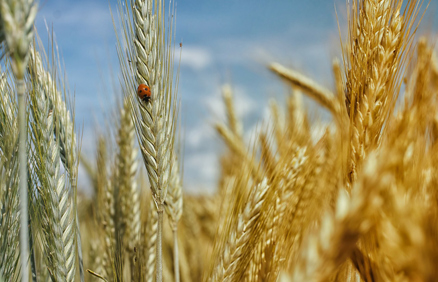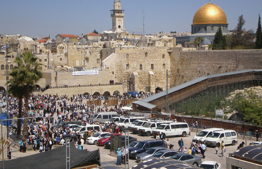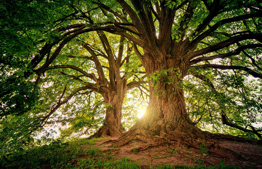Parashat Emor: Sacrifices from Our Produce

Smack in the middle of the description of the festivals is a verse about matanot ani'im, gifts to the poor, one of the Land-dependent mitzvot. What's the connection?
"And when you reap the harvest of your land, you shall not reap all the way to the edges of your field, or gather the gleanings of your harvest; you shall leave them for the poor and the stranger: I the L-rd am your G-d" (Vayikra 23:22).
Why did the text place [the matanot ani'im] in the middle of the festivals? This is to teach us that whoever takes out [of his produce] leket, shichecha, pe'ah, and ma'aser ani it is considered as if the Holy Temple is standing, and he is bringing sacrifices there. And whoever does not take these out, it is as if the Holy Temple exists and he does not offer sacrifices there" (Sifra).
What's the connection between the Land-dependent mitzvot and the festivals?
Chapter 23 of Vayikra is undeniably associated with the Orach Chayim section of Shulchan Aruch, since it discusses the festivals. As such, the verse discussing the matanot ani'im, the gifts to the poor to be separated from one's agricultural produce—which are Land-related mitzvot—seems to be completely unrelated. Our Sages relate to textual peculiarity in the quote above: this verse is there to teach us that whoever gives the matanot ani'im essentially performs an action that has the same importance as the rest of the verses in the chapter, dedicated to the special sacrifices brought for each holiday.
The Beit Hamikdash is the place of the resting of the shechina, the Divine Presence. It is the embodiment of the earthly abode that G-d desires in this lower world. Besides this resting of the shechina, where G-d comes down to meet us, so to speak, there is also an opposite and parallel process where we elevate ourselves to meet Him. This elevation is obviously not with our physical bodies, but rather accomplished through bringing sacrifices. Through offering sacrifices, it is as if we are giving a part of ourselves to G-d, which is considered as if we are offering ourselves to Him.
The blessing that G-d bestows on the field of a Jew living in the Land of Israel is an expression of the resting of the shechina. The Sages also regard it as the conspicuous sign that that the shechina has returned to the Jewish People in its land: "Rabbi Abba also said: You have no more manifest [sign of] the redemption than this, as it is stated: 'But you, mountains of Israel, you shall give your branches, and yield your fruit to My people of Israel, [for they will soon be coming]' (Yechezkel 36:8)" (Sanhedrin 98a).
This is how G-d descends to us. Yet we also can raise ourselves by working with Him, and giving up of ourselves for His sake. While this can be accomplished through our physical bodies, we should also elevate ourselves through our money. This can be done by sharing our G-d given blessing with the poor, in accordance with His commands. It is no wonder that this process is equated with bringing sacrifices. If, however, one neglects to do give the compulsory gifts to the poor from his G-d-given abundance, it demonstrates his unwillingness to do his part in his relationship with G-d: he is essentially sufficing with G-d's coming down to him, as it were, but isn't willing to elevate himself to G-d. For this reason, he is likened to someone living in Temple times who refuses to bring sacrifices.
Matanot ani'im today
Our parasha mentions two of the matanot ani'im. Rambam (Matanot Ani'im 1:7) writes: "We can learn that there are four gifts to the poor from the vineyard: peret, olelot, pe'ah, and shichecha; and three gifts from grain: leket, shichecha, and pe'ah; and two from trees: shichecha and pe'ah." If we add to this the ma'aset ani, the poor man's tithe, given on years three and six of the shemita cycle instead of ma'aser sheni (as part of the process of separating terumot and ma'aserot), then we have the entire list of matanot ani'im (a total of 10 gifts, 10 separate mitzvot out of the 613).
If you haven't heard of farmers leaving a corner of their fields, or of poor people coming to a vineyard to pick the olelot—single grapes that fell off the clusters—you'd be in good company. While some poskim hold that the obligation of giving these gifts is biblical and applies even today in the land of Israel, it is not the general practice to leave matanot ani'im in the field or vineyard. Today's poor are not interested in gathering several sheathes or fruits; it is much more worthwhile for them to collect money. In light of this, the Tur and the Shulchan Aruch (YD 332) rule that there is no obligation to leave these gifts (while there are other opinions, this is the opinion we follow). Nevertheless, in a responsum by Rabbi Ehud Achituv (Emunat Itecha, issue 100, 5773), he concludes that if one knows with certainty that poor people will come to gather this produce—either on their own, or with the field owner's help—the obligation to leave these gifts in the field in the Land of Israel still stands.
In other words, the mitzvah of leaving the matanot ani'im is unlike many other mitzvot, which involve actually giving produce or money. In the case of matanot ani'im, if the intended beneficiary is not interested in receiving the gift, there is no need to give it (at least according to the accepted ruling today); there is no significance in the act of leaving the gifts in the field in and of itself.
Vegetables from Yericho
The people of Jericho did six things; about three of them, [the Sages] protested to them, and about three, they did not protest … and these were the ones about which they did protest to them: they would allow the use of branches growing [on or near] sanctified objects (hekdesh); they would eat fruit that had dropped off [the trees] on Shabbat; and they would leave pe'ah to be taken from vegetables" (Mishna Pesachim 4:8).
A stringency in pe'ah = a leniency in terumot and ma'aserot
Pe'ah is not given only from produce grown in the field, but also from fruits of the tree. However, it is not left from every tree, or from everything growing in the field. One of the rules for defining the type of produce to be left in the corner of one's field is machniso lekiyum, or in other words: a long shelf-life. Wheat and olives have a long shelf-life, so these crops are subject to pe'ah. In contrast, vegetables do not (unless refrigerated); so they are exempt from pe'ah.
At first glance, it seems that the residents of Yericho were stringent: they wanted to give vegetables to the poor, even though they are not required to by halacha. It would seem to be a wonderful initiative on their part. However, the Sages protested against this action, since it comes at the expense of a leniency. Halacha mandates that whatever gifts are given as matanot ani'im are exempt from terumot and ma'aserot. By leaving a corner of their vegetable patches for the poor, which is technically not supposed to be pe'ah, the people of Yericho are essentially inviting the poor to eat untithed produce, tevel, which is forbidden for consumption.
Yericho: from the Valley of Achor to the opening of hope—Petach Tikva
The city Yericho, Jericho, is one of the ancient cities in the Land of Israel, which still stands until today. It was the first city conquered in Yehoshua's conquest of the Land of Israel, and the process of its conquest, and its walls falling, is one of the more famous stories in Tanach. In spite of Yehoshua's curse against anyone who would rebuild the city, Chiel of Beit El built Yericho. Indeed, Yehoshua's curse came to fruition, and all of his sons died: "with his firstborn['s death], he founded it, and with his youngest [son's death] he erected its doors." It seems that the site Chiel rebuilt is the old city, since the new city bearing the same name had been built before that time; Yericho is mentioned several times before, starting from the times of the Shoftim.
In Second Temple times, many of the returnees from the Babylonian exile settled in Yericho; the Sages relate in Ta'anit (27a) that of the 24 priestly divisions, half of them lived in Yericho. Herod and his son Archelaus built winter resorts for themselves there since Yericho, overlooking the Dead Sea, is very warm. From the times of Hillel the Elder, the site served as a meeting place for the Sages.
Yericho is mentioned in Talmudic literature as a very fertile area "the fertile land of Yericho" (dushna shel Yericho), which was included in the portion of Binyamin. Mosaic floors from ancient synagogues dating back to Talmudic times were discovered onsite.
Towards the end of the Ottoman era, the Sultan offered two-thirds of Yericho for sale. Among the participants in the bid was a company called Petach Tikva, whose name was based on the verse: "I will give her vineyards from there, and the Valley of Achor as an opening of hope (petach tikva)" (Hoshe'a 2:17). While Petach Tikva lost the bid for Yericho, it bequeathed its name to the colony it did buy later on, founded on the lands of Kafr Umlabes on the Coastal Plains.
In the Six Day War, Yericho was freed and brought under Israeli rule. However, just as it was the first city conquered first by Yehoshua, it was also the first to be relinquished (along with Gaza) to the Palestinians at the beginning of the Oslo Accords (Sivan 5754, May 1994). The city is considered relatively quiet; albeit, at the outbreak of the Second Intifada, the Yeshiva and ancient Shalom al Yisrael synagogue were burned down (Tishrei 5761, October 2000). It was then, too, that its (in)famous casino became a base for firing on its neighboring Israeli settlement, Vered Yericho. We can only hope and pray for the day that we can revisit the episode mentioned in the Mishna, and discuss the actions of the residents of Yericho: if the Sages censured them for a few of their actions, it seems the rest of them were actually very good.




